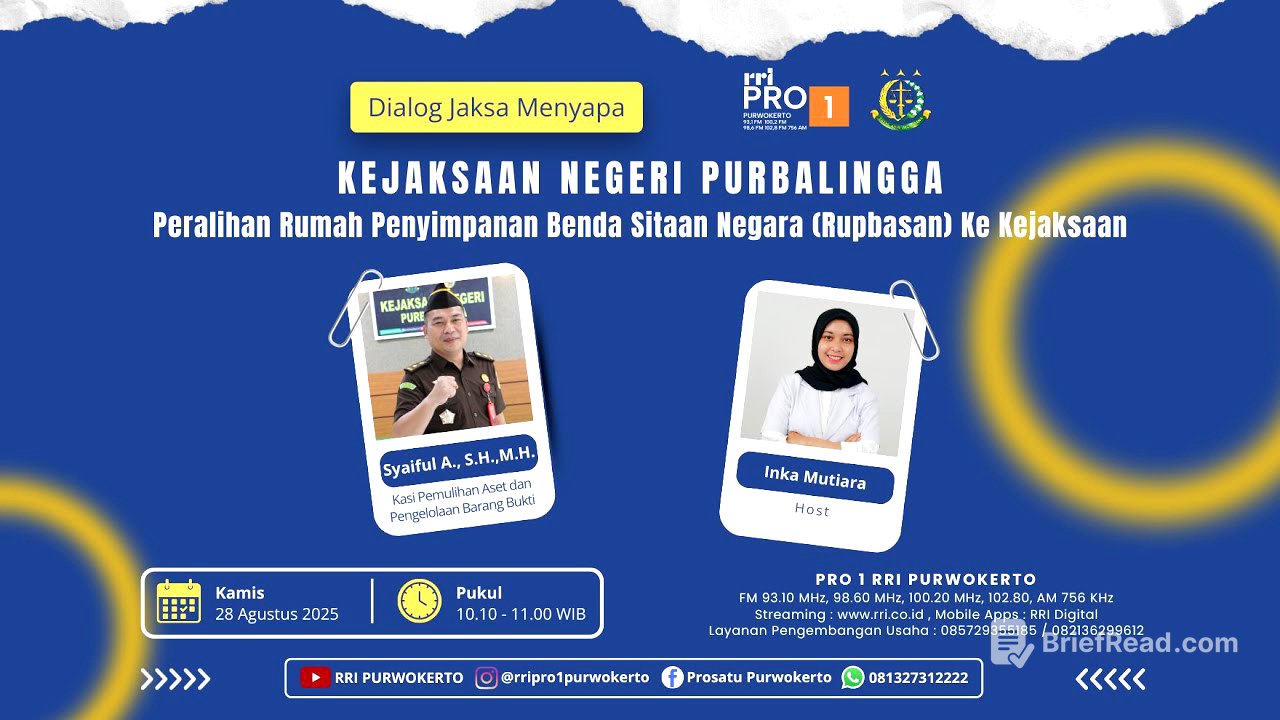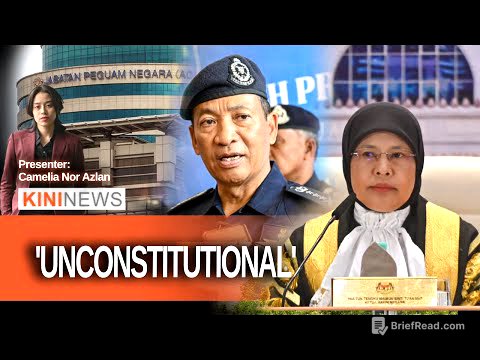TLDR;
This YouTube video from RRI PURWOKERTO features an interactive dialogue titled "The Prosecutor Greets You," focusing on the transfer of the Rubbasan (state confiscated goods storage house) to the Prosecutor's Office, specifically the Purbalingga District Prosecutor's Office. The discussion covers the reasons for the transfer, the differences between confiscated goods and state booty, how evidence is maintained and stored, and the innovations implemented by the Purbalingga District Attorney's Office, such as the mobile evidence delivery service. The speakers also address questions from listeners regarding the management of confiscated goods, auction processes, and the impact of these changes on the community.
- The Rubbasan's transfer to the Prosecutor's Office aims to streamline asset recovery and evidence management.
- Confiscated goods become state booty after a final court decision.
- The Purbalingga District Attorney's Office has implemented innovative services like mobile evidence delivery.
Introduction [0:08]
The "Prosecutor Greets You" dialogue introduces the topic of the transfer of the Rubbasan (state confiscated goods storage house) to the Prosecutor's Office, specifically focusing on the Purbalingga District Prosecutor's Office. The speakers, Mr. Syaifulah Anwar and Mr. Rizkianto, are introduced as experts in asset recovery and evidence management. Listeners are invited to participate through phone calls and WhatsApp messages, and the broadcast is also available on YouTube and the RRI digital application.
What is Rubbasan? [2:56]
Mr. Syaiful explains that the prosecutor's office is responsible for prosecution and execution of decisions, including evidence management and asset recovery. Presidential Regulation Number 155 of 2024 reorganized the state asset storage house, transferring it from the Ministry of Immigration and Corrections to the Attorney General's Office. This move aims to simplify and streamline the duties of managing and caring for confiscated assets, as the prosecutor's office can now handle both management and execution, such as returning or destroying items based on court decisions.
Confiscated Goods vs. State Booty [6:01]
The discussion clarifies the difference between confiscated goods and state booty. Confiscated goods are items seized during a criminal investigation, such as a stolen motorbike. These items become state booty after a final court decision, at which point the court decides whether the item is confiscated for the state or destroyed. The prosecutor then executes the court's decision. The handling of evidence is extensive and depends on whether the object was an instrument of crime, its economic value, and the potential for it to lead to further criminal acts if returned.
Authority and Evidence Storage [10:41]
Mr. Rizkianto explains that previously, Rubbasan, under the Ministry of Law and Human Rights, only had the authority to store and manage evidence to maintain its economic value. Now, under the prosecutor's office, the authority has increased to include execution. The prosecutor's office can now deposit, store, and execute evidence, streamlining the process. The method of maintaining and storing evidence depends on the type of evidence. For example, motorbikes are maintained to preserve their economic value through repairs and cleaning, while dangerous items like explosives are handled with special care.
Evidence Handling and Innovation [13:28]
The speakers discuss the importance of qualifying evidence based on its nature, whether it is dangerous, has economic value, or will decrease in value if not cared for. Dangerous evidence, such as explosives or illegal logging materials, can be settled or executed even before the case is resolved to maintain economic value. The Purbalingga District Attorney's Office has introduced an innovation called "Lanting Baling," a mobile evidence delivery service that delivers evidence to owners in other provinces free of charge.
Conditions for Retrieving Evidence [18:33]
To retrieve evidence, the owner must have been present as a witness and provide identification. The Purbalingga District Attorney's Office aims to simplify the process to enhance public service. A listener asks about the time limit for auctioning items. The response clarifies that there is no specific time limit; items are returned once the case has permanent legal force. However, evidence can be borrowed for use during the trial process, provided it does not alter the evidence's original form and is available when needed.
PNBP and Auction Targets [22:50]
A listener questions whether there is a target for PNBP (non-tax state revenue) from auctioned confiscated goods, implying a potential conflict of interest. The speakers clarify that the prosecutor's office focuses on recovery, restoration, and return, not on meeting specific targets. Auctions are conducted in coordination with KPKNL (State Property and Auction Service Office), which determines the value of the items. The auction process is open to the public and advertised through social media and newspapers.
Auction System and Evidence Outcomes [25:31]
The auction system at the Purbalingga District Attorney's Office is open to the public, with announcements made through social media and newspapers. There are no specific criteria for those who can participate. The results of decisions regarding evidence vary, with legitimate owners having their property returned, narcotics cases resulting in destruction of the evidence, and some items being used as evidence in multiple cases.
Smooth Transition and Community Support [34:30]
The prosecutor's office is taking steps to ensure a smooth transition for the Rubbasan, including providing infrastructure and adapting to uniform doctrines. The community can support this transition by abandoning old habits and adapting to the new environment. The Purbalingga District Attorney's Office has welcomed the Rubbasan employees, and efforts are being made to integrate them into the prosecutor's office.
Attorney General's Birthday and Final Messages [39:58]
The upcoming 80th birthday of the Attorney General is discussed, with the theme being the transformation of the Attorney General's office towards a progressive Indonesia. The Purbalingga District Attorney's Office is supporting the celebrations with activities like a sports week and a pilgrimage to the hero's grave. The speakers express hope that the existence of the Rubbasan will make it easier to manage and maintain evidence, leading to better handling of cases and higher value during auctions. They also encourage the community to follow the proper process for retrieving evidence and assure them that their items will be well-maintained.









